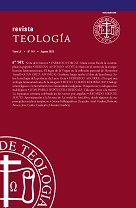Confieso, luego recibo el don de la pobreza
Sobre la teología de la pobreza de Lucio Gera
DOI:
https://doi.org/10.46553/teo.60.141.2023.p43-60Palabras clave:
Negatividad; Pueblo; Resto; Exceso; CaridadResumen
Una inmediata y, por ello, la tesis más mediada ideológicamente sobre la pobreza, puede simplificar la problemática al reducirla un mero concepto negativo, en tanto que falta de posesiones materiales frente a la riqueza, y así dejando de lado
la posibilidad de la pobreza como una forma-de-vida radicalmente redimida y liberada.
Sin embargo, el cristianismo es la fidelidad al acontecimiento histórico del empobrecimiento o kenosis de Dios, el cual ofrece una perspectiva afirmativa sobre la pobreza, tal como enseñó el Apóstol San Pablo (2 Co 8, 9). Lucio Gera en «El misterio del pobre» (1962) reflexionó en torno a la pobreza como imitatio christi y en tanto que existencial reductio in mysterium. En la pobreza, los seres humanos se encuentran sin nada y, de esta manera, acceden al misterio y al don de poseerlo todo en Dios. Gera sostuvo que si la teología busca entender y clarificar la vida la comunidad eclesiástica, debe estudiar exhaustivamente el llamado a la pobreza de tal comunidad. La intimidad entre la confesión de fe y la pobreza como vocación propia de la comunidad cristiana es una tesis teológica, metafísica y política que es necesario elucidar. El articulo estudia la relevancia de la pobreza en la obra de Lucio Gera, con especial énfasis en el primer período de sus escritos.
Descargas
Citas
Agamben, Giorgio. Homo sacer. Edizione integrale 1995-2015. Macerata: Quodlibet. 2022.
Agustín de Hipona, San. Confessiones. Confessionum Libri XIII. Patrologiae cur-sus completus. Sancti Aurelii Augustini hipponensis episcopi Opera omnia. XXXII. Paris. 1841. Confesiones. Tr. Silvia Magnavacca. Buenos Aires: Losada. 2005.
Azcuy, Virginia R. «Una biografía teológica de Lucio Gera». en Escritos Teoló-gicos-Pastorales de Lucio Gera. 1. Del Preconciliio a la Conferencia de Puebla (1956-1981), ed. por Virginia Raquel Azcuy, Carlos Galli y Marcelo González. Buenos Aires: Ágape Libros. Universidad Católica Argentina. Facultad de Teología. 2006.
Benedicto XVI, Papa. Spe Salvi. Sobre la esperanza cristiana. Buenos Aires: Ágape Libros. 2007.
Bender, Jorge Alberto, OFM. «Sólo el pobre es capaz de adorar» en Nuevo Mundo. Revista de Teología Latinoamericana. 55. San Antonio de Padua: Ediciones Castañeda. 1998.
Benjamin, Walter. Gesammelte Schriften. Aufsätze, Essays, Vorträge. Band II. 1, ed. por Rolf Tiedemann y Hermann Schweppenhäuser. Frankurt a. M.: Suhrkamp. 1977.
Benjamin, Walter. Gesammelte Schriften. Fragmente vermischten Inhalts. Autobiographische Schriften. Band VI; ed. Por Rolf Tiedemann y Hermann Schweppenhäuser. Frankurt a. M.: Suhrkamp. 1985.
Bianchi, Enrique Ciro. «Muchas veces la brújula, el olfato, lo tiene el Pueblo de Dios», Vida Pastoral 318. San Pablo: Pia Sociedade de Sâo Paulo. (2013): https://repositorio.uca.edu.ar/handle/123456789/11198
Francisco, Papa. Evangelii Gaudium. Exhortación apostólica. Ciudad Autónoma de Buenos Aires: Conferencia Episcopal Argentina. Oficina del libro. 2013.
Galli M., Carlos. «Epílogo. Interpretación, valoración y actualización del pensa-miento teológico de Lucio Gera en «Del Preconcilio a la Conferencia de Puebla» (1956-1981).» en Escritos Teológicos-Pastorales de Lucio Gera. 1. Del Preconciliio a la Conferencia de Puebla (1956-1981). Virginia Raquel Azcuy, Carlos Galli y Marcelo González (eds.). Buenos Aires: Ágape Li-bros. Universidad Católica Argentina. Facultad de Teología. 2006.
Gera, Lucio. «Reflexión sobre Iglesia, burguesía y clase obrera» [1957] en Escri-tos Teológicos-Pastorales de Lucio Gera. 1. Del Preconciliio a la Confe-rencia de Puebla (1956-1981), ed. por Virginia Raquel Azcuy, Carlos M. Galli y Marcelo González. Buenos Aires: Ágape Libros. Universidad Cató-lica Argentina. Facultad de Teología. 2006. [de aquí en adelante ETP 1]
Gera, Lucio. «Hay lágrimas en las cosas» [1957] en ETP 1.
Gera, Lucio. «Sobre el misterio del pobre» [1962] en ETP 1.
Gera, Lucio. «Presentación de la Revista Teología» [1962] en ETP 1.
Gera, Lucio._Familia y liberación. Buenos Aires: Impres. AICA. Cuadernos de Pastoral Familiar. Movimiento Familiar Cristiano. Comisión Nacional. 1972.
Gera, Lucio. «Cultura y dependencia a la luz de la reflexión teológica» [1974] en ETP 1.
Gera, Lucio. «Agradecer, recordar, relatar. Homilía pronunciada en la Misa de Acción de Gracias por sus cincuenta años de sacerdocio, el 19 de septiembre 1997, en la iglesia parroquial Inmaculada Concepción» en Nuevo Mundo. Revista de Teología Latinoamericana. 55. San Antonio de Padua: Ediciones Casta-ñeda. 1998.
Gera, Lucio.«“Nadie tiene mayor amor” (Jn 15, 13). El Itinerario del amor de Simón Pedro a Jesús» en Meditaciones sacerdotales, ed. por Virginia Raquel Az-cuy, José Carlos Caamaño, Carlos M. Galli. Buenos Aires: Ágape Libros. 2015.
González de Cardedal, Olegario. «Existencia cristiana y experiencia religiosa», en Panorama de la teología española. Cuando vida y pensamiento son in-separables, ed. por J. Bosch, Navarra: Verbo Divino. 1999.
Heidegger, Martin. Das Ereignis [1941-1942], Gesamtausgabe LXXI, ed. por F. W. von Herrmann. Frankfurt am Main: Vittorio Klostermann. 2009.
Leonardi Delmás, Juan Marcelo. Pobre, pueblo y cultura. Aproximación a una teología del don en Lucio Gera. Buenos Aires: Agape Libros. 2018.
Marion, Jean-Luc. Dieu sans l'être. Paris: Communio/Fayard. 1982.
Scannone, Juan Carlos, SJ. La teología del pueblo. Raíces del papa Francisco. Cantabria: Editorial Sal Terrae. 2017.
Schmitt, Carl. Cattolicesimo romano e forma politica. La visibilità della Chiesa. Una riflessione scolastica, ed. por Carlo Galli. Tr. Carlo Sandrelli. Giuffrè Editore. 1986.
Publicado
Cómo citar
Número
Sección
Licencia
Derechos de autor 2023 Juan Cruz Aponiuk

Esta obra está bajo una licencia internacional Creative Commons Atribución-NoComercial-CompartirIgual 4.0.


















 Teología
Teología